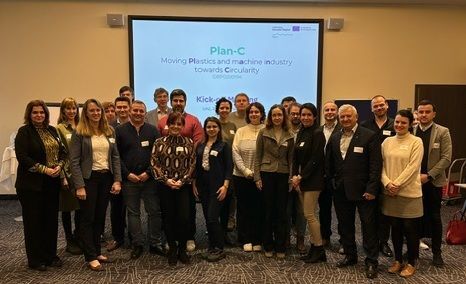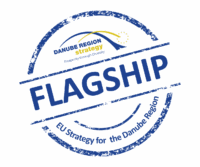
Project; ongoing
EUSDR Priority Area(s): PA 8 Competitiveness of Enterprises
The Plan-C project consortium of 14 partners from Germany, Austria, Czechia, Slovakia, Hungary, Serbia, Bosnia and Herzegovina, Romania and the Republic of Moldova aims to boost the transformation of the plastics value chain in the Danube Region towards circularity through the transnational cooperation of plastics processors/producers and the machine industry. Close cooperation among partners across the Danube Region countries is required to introduce a fundamental change in this complex plastics value chain, implying a radical shift of mindsets, behaviour, and business paradigms.
Objectives: Based on a transnational technology transfer and utilising a design thinking process, the Project Partners and plastics producers co-create and immediately demonstrate circular plastics prototypes. The resulting Circular Plastics Guideline will aim at building up knowledge and capacities for its practical implementation in regional companies.
Project Partners and machine firms will analyse, ideate, and prototype circular solutions for each machine life cycle phase and create related digital business models along the whole machine life cycle, summarised in a Guideline for circularity in the machine industry.
These above described two objectives aim at fostering cooperation and exchange of knowledge between SMEs, clusters, and academia (Action 1, Target 3 in EUSDR Action Plan). Further, the development of circular business models exploits digitalised processes in SMEs and through the piloting of both objectives the innovation ecosystem in the Danube Region is established or enriched (Action 2 in EUSDR Action Plan).
The third objective is the creation of a related Transnational Action plan for boosting circularity in the entire plastics value chain (plastics producers + machine industry), based on the latest EU regulations and in close cooperation with the regional policy level in each partner country. This will ensure transfer to the RIS3 of the partner countries with intensified awareness raising and proposing new support measures for local SMEs (Action 3 in EUSDR Action Plan).
Need and (expected) impact: Plastics represent a high-performance material that is omnipresent in modern life, but by far not sufficiently recirculated after first use. The goals of the EU circular economy package, i.e., a recycling quote of plastics packaging of 50% until 2025, remain challenging, even for the forerunner Danube Region countries; additional EU regulations within the Green Deal have recently been issued and further ones are expected to come. Therefore, it is of utmost importance to support SMEs to proactively transform their product development, the product life cycle management and to create related business models in line with the idea of a circular economy.
Equally important is to anchor this goal on a strategic level with strongly involvement in the policy level.
The uptake of the Guidelines for a circular plastics industry will result in increased capacities in SMEs and new/intensified cooperation between SMEs, clusters, and academia. The close collaboration with the policy level, e.g., through the involvement of the associated strategic partners, enables the uptake of project results in RIS3.
Macro-regional dimension: The project has a clear macro-regional dimension and a multi-level governance approach. It contributes to specific actions and targets of the PA 8 as defined in the EUSDR Action Plan.
Within the Plan-C project, 14 partners from Germany, Austria, Czechia, Slovakia, Hungary, Serbia, Bosnia and Herzegovina, Romania and the Republic of Moldova collaborate with 10 Associates Strategic Partners who represent the policy/strategic level in the above-mentioned Danube Region countries.
Throughout the implementation of this project, the main actors in the value chain – plastics producers and machine firms – increase their competitiveness, which contributes to the achievement of the EUSDR PA 8 goals.
It is expected that the project results will not only have an impact on the participating regions, but also on the entire partner countries and, through intense dissemination activities, also on neighbouring countries, e.g. Croatia, Slovenia, and Montenegro. Further, the project will also be promoted by the following PA 8 Working Group (WG) members:
The Project Partner Clustero (Mr Daniel Cosnita) is a member of the WG – Clusters and Regional Development, while the Lead Partner Business Upper Austria, the Project Partner aws – Austria Wirtschaftsservice, and the Associated Strategic Partner Pforzheim University are members of the WG Artificial Intelligence.
Stakeholders involved: Public institutions, regional agencies, chambers of commerce, universities, institutes, clusters, competence centres, business centres etc.
Lead Partner:
- Business Upper Austria – OÖ Wirtschaftsagentur (involved departments: Plastics & Mechatronics Cluster, Policy dept. for Upper Austrian Economic Strategy), Austria
Project Partner:
- aws – Austria Wirtschaftsservice, Austria
- Technology Center Horb, Germany
- Plastr – Czech Plastics Cluster, Czechia
- Tomas Bata University in Zlín, Czechia
- SPK -Slovak Plastic Cluster, Slovakia
- TUKE – Technical University of Košice, Faculty of Manufacturing Technologies with a seat in Prešov, Slovakia
- Omnipack – First Hungarian Packaging Technology Cluster, Hungary
- Innovation Center of the Faculty of Mechanical Engineering (Univ. Belgrade), Serbia
- CLUSTERO – Romanian Cluster Association, Romania
- “Petru Poni” Institute of Macromolecular Chemistry, Romania
- Innoskart Business Development Nonprofit Kft., Hungary
- FITT – Foundation for Innovation, Technology and Knowledge Transfer, Bosnia and Herzegovina
- Sorintex – Association of Light industry enterprises. Republic of Moldova
Associated Strategic Partner:
- Circular Economy Forum Austria, Austria
- Austrian Federal Ministry Climate Action, Environment, Energy, Mobility, Innovation and Technology, Austria
- Pforzheim University, Germany
- Regional Economic Development Agency of Northern Black Forest, Germany
- Prime Minister’s Office, Managing Authority of Economic Development Programmes, Hungary
- INNOVA Észak-Alföld Regional Development and Innovation Agency Nonprofit, Hungary
- Chamber of Commerce and Industry of Serbia, Serbia
- Technology Innovation Centre, Czechia
- National Cluster Association, Czechia
- Slovak Chamber of Commerce and Industry, Trenčin Regional Chamber, Slovakia
- Ministry of Economy Romania, Romania
Budget and Funding:
Total Interreg Funds: EUR 1 735 600
Total Eligible Budget: EUR 2 169 500
Further information:
- https://interreg-danube.eu/projects/plan-c
- https://www.linkedin.com/company/plan-c-moving-plastics-and-machine-industry-towards-circularity/
- https://www.youtube.com/@plancprojectdanuberegion14
Contact: Ms DI Eva Breuer, Project Manager, Business Upper Austria – OÖ Wirtschaftsagentur GmbH (Mechatronics Cluster),



